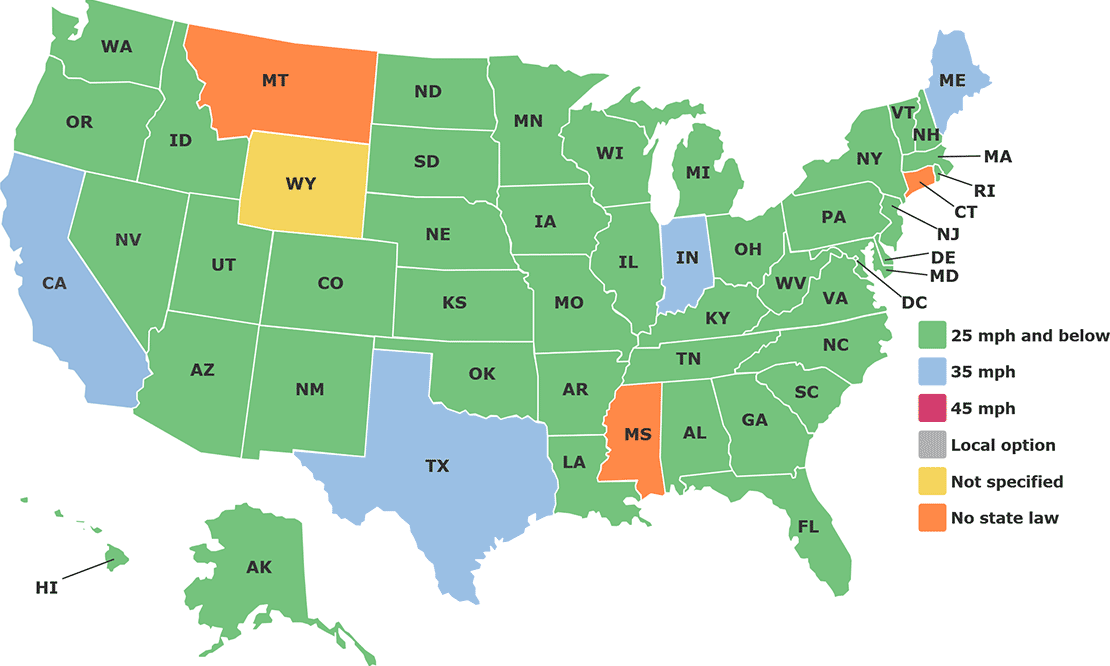What is an LSV?
LSV stands for "Low Speed Vehicle." An LSV is a street legal cart that has a minimum speed of 20 mph and maximum speed of 25 mph, and can legally be driven on most roads posted 35 mph or less (see graphic for exact speed limits according to your state). An LSV is a small, low speed car.
All vehicles must meet all U.S. federal safety standards for low-speed vehicles (LSVs) and be equipped with automotive safety windshield glass, three-point safety belts, turn signals, headlamps and brake lights, horn, mirrors, windshield wipers and on-road tires.
Your particular state may have additional laws and regulations pertaining to LSV's. We'll help you through the entire purchasing process!

Roads on which LSV vehicles can be driven. Source: Insurance Institute for Highway Safety.
What is the process for making my LSV legal for public road use?
While each state may have different requirements regarding your LSV, there are a few things you can plan on doing regardless of location.
-
Step 1
Find a legal LSV as deemed by the National Highway Traffic Safety Administration: Make sure you have the Certificate of Origin, title, or out-of-state registration listing the body style or body type as "LSV" or "Low Speed Vehicle."
https://www.govinfo.gov/content/pkg/CFR-2011-title49-vol6/pdf/CFR-2011-title49-
https://www.dmv.ca.gov/portal/dmv/detail/pubs/brochures/fast_facts/ffvr37
https://www.nhtsa.gov/ -
Step 2
Get Registered: Then, an application for registration and title, or an DMV form, should be completed. Registration, title fees and applicable tax are paid directly to your DMV office. In most states, the following documentation is required to process your registration and title:
- A manufacturers Certificate of Origin (new vehicles only), or
- The previous owner's Certificate of Title, Dealer Re-Assignment form if applicable, or
- The previous registration and bill of sale for vehicles that are exempt.
-
Step 3
Get Insurance: Once you've made sure your LSV is properly registered, contact your insurance agent to discuss insurance options. You'll want to make sure your LSV is covered by a policy that includes Personal Injury Protection and Property Damage Liability coverage at a minimum.
-
Step 4
Get Inspected: To be on a public way, LSVs must be registered, titled, insured, and inspected. If an electrical motor or batteries solely powers the vehicle, no emissions test is required. If, however, the LSV is liquid-fueled, the emissions test is required. In CA, only electric LSV’s are allowed.
What are the required components of an LSV Vehicle?
All vehicles must meet all U.S. federal safety standards for low-speed vehicles (LSVs) and be equipped with:
- Automotive safety windshield glass
- Three-point safety belts (3 seatbelts)
- Turn signals
- Headlights and brake lights
- Horn
- Mirrors
- Windshield wipers
- Speedometer
- On-road tires
- Rear visibility technology ( back up camera w digitized screen)
- Parking brake
- The Manufacturer's Certification Label posted on the vehicle containing the 17 Digit VIN and indicating the TYPE of vehicle as a "Low Speed Vehicle"
https://www.transportation.gov/
Can my child drive my LSV?
If your child does not have his or her learner's permit or driver's license, they are not permitted to drive an LSV. An LSV is considered a low-speed street legal vehicle and should be treated as such. In most states a valid Drivers License is required to drive an LSV.
Is insurance required on an LSV?
Yes, it is a car. As an LSV is classified as a street legal vehicle and is permitted to be driven on public roads, your LSV must be insured under an auto policy that includes Personal Injury Protection and Property Damage Liability coverage at a minimum.
Most if not all states in which they are legal require them to be insured, registered and operated only by licensed drivers.
Can I modify my current golf car to make it an LSV?
No. Only golf carts with a 17 digit VIN and the requirements listed above can be called an LSV.
